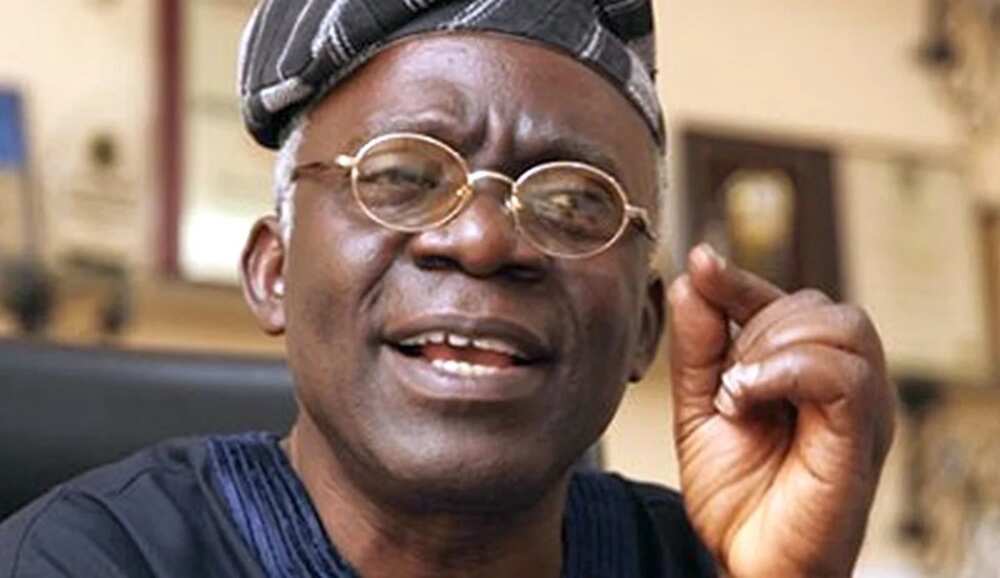Top Nigerian lawyer Falana writes Zuma, demands justice for xenophobia victims
Eminent Nigerian lawyer Femi Falana has written to South African President Jacob Zuma and urged him to urgently identify and prosecute persons and groups behind the xenophobic attacks against Nigerians in that country.

Daily Sun reports that Falana also wants the victims of the attacks to be compensated by the South African government.
READ ALSO: Shiites massacre: Pressure continues to build up as Zakzaky's wife writes open letter to Buhari
In the letter written on Thursday, March 9 and titled “Re: Request to identify perpetrators of xenophobic attacks against Nigerians, bring them to justice and provide adequate compensation to victims”, Falana warned that should the South African government fail to stop the attacks, he would drag the country to the AU Human Rights Commission.
Falana’s letter read: “We are writing to request you to use your leadership position to urgently identify suspected perpetrators of criminal acts and xenophobic attacks against Nigerians and other Africans living in South Africa and to bring them to justice promptly. We also urge you to promote and ensure access to justice and the right to effective remedy and reparations to victims.
“Since 2008, the xenophobic violence and other criminal acts have continued to occur across South Africa claiming lives, displacing tens of thousands of people and leaving countless victims injured and robbing them of their property. Although some arrests have reportedly been made, many perpetrators are yet to be brought to justice while the victims continue to be denied access to justice and their internationally recognised right to an effective remedy and reparations.
“We believe that it is the failure of your government to bring perpetrators to justice and protect the victims of the xenophobic attacks that has resulted in a vicious cycle of attacks and impunity. These xenophobic attacks and violence are not only human rights violations but also criminal acts, and the persistent failure to proactively address the problems is a serious affront to the rule of law, and directly breaches your government’s international human rights obligations including under the African Charter on Human and Peoples’ Rights, particularly Article 12 on the right to movement.
“We contend that free movement is crucial for the protection and promotion of human rights and fundamental freedoms. Freedom of movement and residence are two sides of the same coin. Article 12 of the Charter guarantees freedom of movement in the broadest sense, and also expressly prohibits mass expulsion, a recurring problem in South Africa under your watch. We also argue that the exercise of sovereign power by a State to expel non-nationals who are legally admitted into its territory must follow due process, and be manifestly legal and comply with international standards.
“The African Commission on Human and Peoples’ Rights has in fact stated in Rencontre africaine pour la Défense des Droits de l’Homme v Zambia (Communication 71/92) that, “those who drafted the Charter considered large scale expulsion as a special threat to human rights. In consequence, the action of a State targeting specific national, racial, ethnic or religious groups is generally qualified as discriminatory in this sense as it has no legal basis.” Similarly, the Commission has stated in John K Modise v Botswana (Communication 97/93) that, “[W]hile the decision as to who is permitted to remain in a country is a function of the competent authorities of that country, this decision should always be made according to careful and just legal procedures, and with due regard to the acceptable international norms and standards.”
PAY ATTENTION: Get the latest news on Legit.ng News App
“Therefore, Article 12 imposes an obligation on your government to secure the rights protected in the Charter to all persons including Nigerians and other Africans within your country’s jurisdiction. Such obligation is breached when victims are denied the opportunity to be heard regarding the decision to expel them, either prior to or after their expulsion.
“We therefore urge you to move swiftly to address the debilitating situation by identifying and arresting the perpetrators and bringing them to justice promptly. We also urge you to publicly commit to providing access to justice and effective remedy to victims. Effectively prosecuting the perpetrators and providing reparations to victims would serve as a deterrent to future attacks. We also urge you to put measures in place to proactively protect non-nationals including Nigerians living in South Africa.”
Legit.ng recalls that South Africa's national police chief Khomotso Phahlane said 156 people were arrested in various incidents during the anti-foreigner march in Pretoria in late February.
According to Phahlane, random acts of violence, looting and destruction of property had occurred during the protest.
Source: Legit.ng
